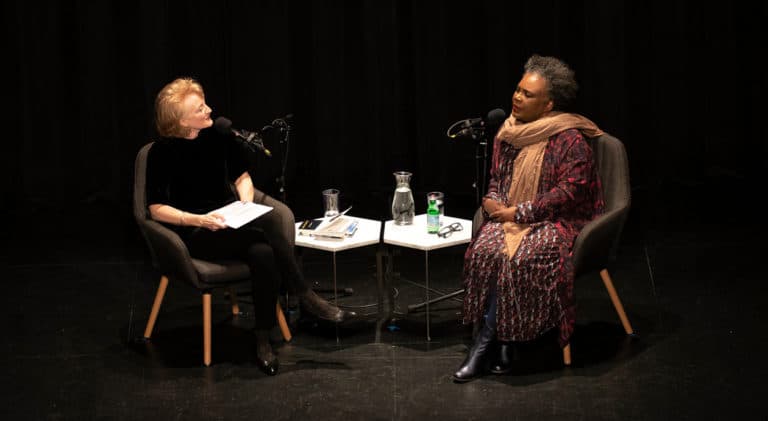John O'Donohue
Beauty Is an Edge of Becoming
“Beauty isn’t all about just niceness, loveliness. Beauty is about more rounded, substantial becoming.” Beloved Irish poet John O’Donohue on beauty’s true grit, and finding it in the transformational edges of our daily lives.
Guest

John O'Donohue was a poet, theologian, and philosopher. He authored beloved books, including Anam Ċara and Beauty: The Invisible Embrace. To Bless the Space Between Us, a collection of blessings, was published posthumously. A wonderful book drawn from his voice in conversation, Walking in Wonder: Eternal Wisdom for a Modern World, was published in November 2018.
Transcript
Krista Tippett, host: Culturally, beauty is one of those muddied words. Our minds have been trained to go to perfect bodies and flawless faces on the covers of magazines. But that, as the late, great Irish poet and philosopher of beauty John O’Donohue helpfully distinguished, is glamour. I’ve taken his definition as my own, for naming beauty in all its nuance in the moment-to-moment reality of our days: beauty is that in the presence of which we feel more alive.
John O’Donohue’s own creativity of philosophy and poetry and being emerged from the dazzling raw land of Connemara in western Ireland:
John O’Donohue: “It’s the Burren region, which is limestone. It’s a bare limestone landscape. And I often think that the forms of the limestone are so abstract and aesthetic, it is as if they were all laid down by some wild surrealistic kind of deity. Being a child and com- ing out into that, it was waiting like a huge wild invitation to extend your imagination. And it’s right on the edge of the ocean as well, and so there’s an ancient conversation between the ocean and the stone going on. I think that was one of the recognitions of the Celtic imagination: that landscape wasn’t just matter, but that it was actually alive. Landscape recalls you into a mindful mode of stillness, solitude, and silence, where you can truly receive time.”
Ms. Tippett: John O’Donohue was poetic about the possibility of creating our own inner landscapes of beauty, to keep us vital in the midst of bleak and dangerous surroundings and experiences. He gave voice to the connection between beauty and those edges of life — “thresholds” was the word he loved — where the fullness of reality becomes more stark and more clear:
Mr. O’Donohue: If you go back to the etymology of the word ‘threshold,’ it comes from ‘threshing,’ which is to separate the grain from the husk. So the threshold, in a way, is a place where you move into more critical and challenging and worthy fullness. There are huge thresholds in every life. You know that, for instance, if you are in the middle of your life in a busy evening, fifty things to do and you get a phone call that somebody you love is suddenly dying, it takes ten seconds to communicate that information. But when you put the phone down, you are already standing in a different world. Suddenly everything that seems so important before is all gone and now you are thinking of this. So the given world that we think is there and the solid ground we are on is so tentative. And a threshold is a line which separates two territories of spirit, and very often how we cross is the key thing.
Ms. Tippett: And where is beauty in that?
Mr. O’Donohue: Where beauty is — beauty isn’t all about just niceness, loveliness. Beauty is about more rounded substantial becoming. And when we cross a new threshold worthily, what we do is we heal the patterns of repetition that were in us that had us caught somewhere. So I think beauty in that sense is about an emerging fullness, a greater sense of grace and elegance, a deeper sense of depth, and also a kind of homecoming for the enriched memory of your unfolding life.
Ms. Tippett: You’ve rightly said that we tend to associate beauty with glamour. I think if you just mention the word, if you just throw it into a commonplace conversation, someone might just think of a beautiful face, of a famous beautiful face, right? When you think of the word “beauty,” what pictures come into your mind?
Mr. O’Donohue: “When I think of the word ‘beauty,’ some of the faces of those that I love come into my mind. When I think of beauty, I also think of beautiful landscapes that I know. Then I think of acts of such lovely kindness that have been done to me, by people that cared for me, in bleak unsheltered times or when I needed to be loved and minded. I also think of those unknown people who are the real heroes for me, who you never hear about, who hold out on frontiers of awful want and awful situations and manage somehow to go beyond the given impoverishments and offer gifts of possibility and imagination and seeing. I also always when I think of beauty think of music. I love music. I think music is just it. I love poetry as well, of course, and I think of beauty in poetry. But music is what language would love to be if it could.”
Ms. Tippett: My conversation with John O’Donohue went on for more than two hours and was exhilarating. Two months later, though strong and vital at the age of 52, he died suddenly in his sleep. He left poetry in the world, and a final book of blessings. Life and loss process together, as do grief and beauty.





